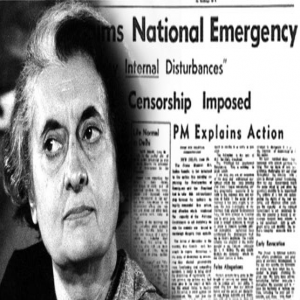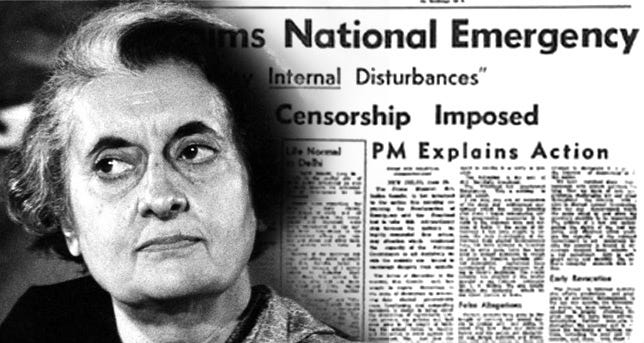
.png) Robert Clements
Robert Clements

Fifty years ago, Mrs Indira Gandhi did something absolutely shocking. No, not out-English the BBC anchor who interviewed her—but something more... historical: The Emergency.
For twenty-one months, India was in lockdown before lockdowns were cool. Newspapers were gagged, opposition leaders bundled off like stray cattle, and the only thing allowed to circulate freely was Indiraji's carefully combed photograph—smiling beatifically as if to say, "This is going to pinch just a bit. For... two years."
And every June since, our current ruling party brings out the customary Nehru-bashing. "Look what they did!" they cry, waving history books.
But here's the delicious irony. While wagging a very patriotic finger at the past, they've quietly pulled off the same trick—only slicker. It's like watching a magician scold another magician for pulling a rabbit out of a hat… while casually producing an elephant from their kurta.
No declaration, no sirens. Just a gentle massaging of laws. A nudge here, a jab there. Redefine "terrorist" till it includes anyone with a different opinion. Today, if you so much as whisper against the ruling party, you're either a Maoist, a missionary, or a mildly deranged magician. Bail? That's reserved for people who confuse government funds with their own wallets—not those who confuse democracy with free speech.
It's subtle, this Emergency 2.0. No blackouts. Just blackout curtains on reason.
It's like laughing at someone passed out on desi toddy while you spike your Horlicks every night with vintage single malt. "Poor soul," you say, adjusting your nightcap as you break into spontaneous bhangra in your sleep.
We're all part of this great national lullaby. Rocked to sleep with daily doses of Mandir! Masjid! Moral outrage!—served piping hot on prime-time TV. We're so distracted that the Taj Mahal could be renamed and converted into a banquet hall, and we'd still be busy discussing who should be banned next.
Back in 1975, at least the people knew there was an Emergency. They whispered in corners, printed secret pamphlets, and got arrested with dignity. Today, we whisper compliments. "What a visionary leader!" we murmur. "He even plans our opinions for us."
And the media? Oh, bless their paid souls. Once lions of the Fourth Estate, they now purr like well-fed kittens in the laps of power. "Tonight's breaking news: The economy's booming, the weather's perfect, and our political leaders can walk on water. And now, a patriotic item number!"
So, yes, dear reader, back then, we had a grim, sulking Emergency.
Today, we've got a cheerful, Instagrammable one!
Complete with fireworks, festivals, flying chappals, and WhatsApp wisdom. We are free… to chant whatever we like, as long as it's from the approved syllabus.
But hey—we're smiling, aren't we?
Welcome to the Happy State of Emergency:
Where freedom is carefully curated, minds are pre-cooked, and Big Brother doesn't need to frown—he just raises one eyebrow... and we salute…!